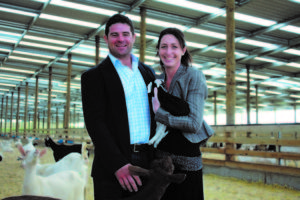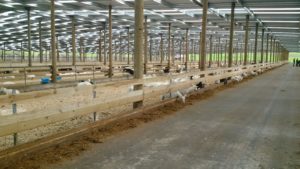No Kidding Around with Goats!
From the very start, Matt and Sarah Bolton had a vision for their goat operation – to be one of the best.
In 2014, the couple decided to step up and start the first goat milking operation in Auckland. Partnering with New Image Group Nutritionals to provide premium infant formula to parents around the world, they made a commitment to quality and transparency from day one.
The challenge ahead wasn’t easy. The couple had one shot to design and build a robust, profitable farm system to care for 3,000+ goats. The biggest hurdle was working with a council new to goats, not just for approval and consents, but in building a model for others to follow.
It was in these early days that picking the right infrastructure partner payed off.
Peter from Aztech Buildings was the man for the job. Before the technical work and council box-ticking, Peter took up a support role for the couple. He arranged farm tours with other goat raising clients, guided the council approval process and helped the couple shape and define their vision.
Great infrastructure is about getting the small stuff right. Mistakes and missed opportunities matter in the long run when a building stands for decades.
Optimising the 1.2 hectare shed for the local weather, daily wear & tear and biological challenges of goat raising meant the details really mattered. Including:
Wall and ceiling heights that allowed for a breeze, but no wind.
Finding the lighting sweet spot between warmth and bug-loving humidity.
Making the tough calls on a time-saving, but expensive and complex feed conveyor.
Choosing a colour that balanced aesthetics with heat reflection and resilience.
The couple have some straightforward advice for other up-and-coming goat farmers – have a clear vision and invest in the right people and systems to get you there. Be it staff, mentors or partners like Peter, find those people who genuinely want you to succeed and nurture that relationship.
Four years later and the operation is not just up-and-running, but primed to grow. True to their word, Matt and Sarah have opened their farm to the public and regularly host tourists, customers, school and community groups. For them, putting their best-foot forward and proudly telling their farming story today, started with getting the basics right years ago.
As for growing the operation, another shed is in the works. No design changes necessary.
Get the facts on goats!
The NZ Dairy Goat Industry
There are around 66,000 dairy goats in New Zealand, housed across 92 farms.
The Waikato is our dairy goat heartland, with 72% of the national population.
On the Up and Up
Goat milk products are increasingly popular – from low lactose, nutritious infant formula to high-end cheeses like chevre and feta.
It all starts with the milk. A high protein, low fat profile makes goat milk more easily digestible and less allergenic than its cow counterpart. It’s a great fit for lucrative nutritional niches around the world, like medicinal powered milk tablets in Asia or supplementary milk for lactose intolerant infants.
The dairy goat industry is projected to be worth a tidy $400 million in export revenue by 2023, thanks to a new $30 million public-private programme to deliver breakthrough research and improve farming standards.
Dairy Goats: The Kiwi Way
The average herd size for a commercial operation in New Zealand is 750 milking does.
Around 85% of the local population are Saanen goats, favoured for their high milk yield and docile nature.
Dairy goats can struggle in wet, cold conditions, so most farmers operate a barn-home model and feed via a cut-and-carry forage system with supplementary grains or maize for a balanced diet.
A healthy doe, raised indoors, will produce an average of 2 kids and 86kg of milk solids per year which is roughly double the production of those raised outside and will be less likely to have worm or feet problems.
The Dairy Goat Lifestyle
For many kiwi farmers, dairy goats represent a lighter way to farm. The animals are easy on the environment, small enough to handle and generally placid and gentle.
Goats give farmers flexibility to fit their lifestyle – be it partial-retirement, making farm work accessible for younger people and women or manageable diversification on the farm.
The Numbers
The goat milk payout hovers around $13 to $18 per kg of milk solids, with costs around $8-9 per kg. That’s a healthy return generated from a relatively small parcel of land.
Starting costs can run high though, you only get one shot to build the right infrastructure for your operation.
It’s Never Easy…
While dairy goats are an attractive option for diversification, there are pitfalls for first-timers.
Processors are renowned for tightly limiting the number and caliber of new suppliers to protect their premium niche. Shareholder buy-ins can be expensive.
For those new to dairy, adjusting your business to a payout schedule can be challenging.
Finding qualified staff and support people like vets can be tough in the small sector.
Goats are very susceptible to disease and health risks.
Source: New Zealand Goat Industry. Scholtens, Lopez-Lozano and Smith. Massey University 2017

